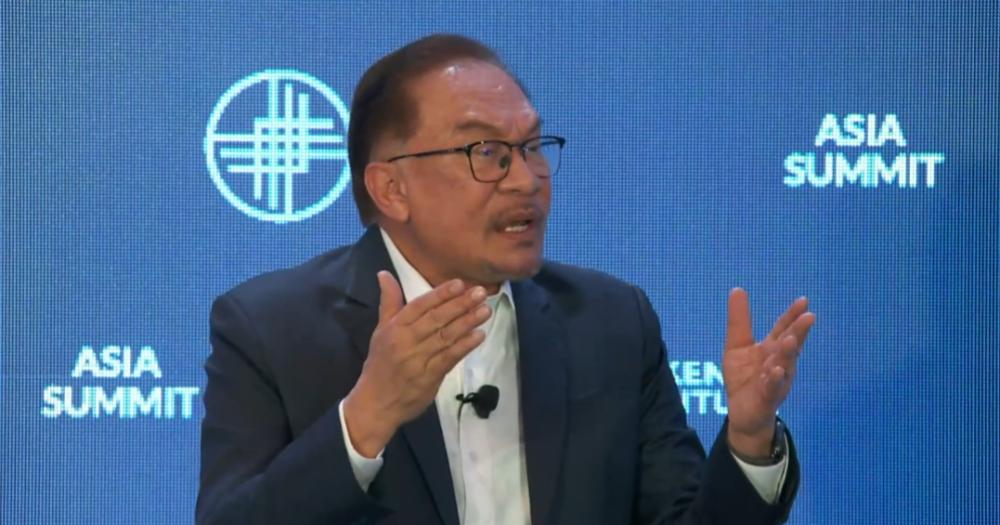Malaysia prime minister Anwar Ibrahim spoke at the Milken Institute's Asia Summit 2023 in Singapore on Sep. 13.
His 50-minute dialogue with Haslinda Amin, the Chief International Correspondent for Southeast Asia for Bloomberg, involved being quizzed about Malaysia's current political situation, including the recent discharge not amounting to acquittal of deputy prime minister and UMNO chief Ahmad Zahid Hamidi's 47 charges of corruption.
Divided but democratic
Amin started by asking how challenging it had been for Anwar to govern the "very divided country" that he had inherited, which was split along both religious and racial lines, while not having support from most of the majority Malay group.
Anwar replied that Malaysia was not the only country struck by division, and added that race and religion were issues "played up by the opposition", whom he described as the "right wing and Islamic party".
However, he did not specify if he was speaking of Parti Islam se-Malaysia (PAS), or Perikatan Nasional as a whole.
But he drew a comparison between the six state elections in August, which saw the states split half-half between the government and the opposition, versus the very recent pair of by-elections in Johor on Sep. 9, which Anwar's Pakatan Harapan coalition won "comfortably", according to Malay Mail, albeit with low voter turnout.
Anwar said the results of the by-elections showed that his government has proven that it was able to disseminate the information that Malaysia could "ill afford that sort of extremist tendencies".
Two thirds
He also pointed out that the government had nearly a two-thirds majority in parliament, dismissing talk of instability within his bloc.
Left unsaid was that the loss of the two-thirds majority was due to Muar MP Syed Saddiq leaving the government over concerns about the dropping of corruption charges against the DPM Ahmad Zahid Hamidi.
He also dismissed the idea that the opposition's vigorous criticism of his government was a sign of instability, giving the example of the review of the second Malaysia plan and saying that the opposition's "lambasting" the government was fair and part of the democratic process, and that in time he would have his say.
DNAA
Amin then pressed Anwar on his stance on governance, saying that he held an anti-corruption stance, but then contrasted it with the recent dropping of the case against coalition partner and DPM Zahid.
Zahid now has no outstanding charges against him, after being acquitted of 12 counts of corruption in September 2022, before Anwar became PM, and on Sep. 4, Zahid received a discharge not amounting to acquittal (DNAA) on 47 other charges.
Amin questioned whether it was bad optics for Zahid to get off "scot-free".
Anwar rebutted this assertion by disputing several aspects of Zahid's charges, starting with the number of charges, saying they were "questionable" by targeting each cheque that Zahid had issued.
He then questioned the timing of the charges, saying that Zahid had been charged while Mahathir Mohamad was the prime minister, and a week after Zahid had declined to dissolve UMNO and join Mahathir's then party, Bersatu.
Anwar said his intention was not to defend Zahid, but only to relay what had been told to him by his attorney general, who had been appointed by Anwar's predecessor Ismail Sabri Yaakob, whom Anwar retained despite having the power to replace.
The AG had given Anwar the 11 reasons that would be presented in court, and as the AG predicted, the judge had accepted the reasoning.
Perception
But Anwar acknowledged that the perception would not be good, especially as corruption had become "endemic" in Malaysia, referencing the 1MDB case.
Anwar said this perception of Malaysia as corrupt would take time to deal with, and as PM, he would not "concede or compromise on this", and that in time people will realise that he "will not stand for this nonsense".
He said: "The country, which can be great, has been destroyed because of greedy, corrupt politicians. That is my position."
Zahid's case was, he added, at the AG's sole discretion.
Anwar was asked if the prosecutor's office falling under his purview raised questions about the decision and harmed his own credibility.
He replied that what was important was that neither he nor any members of his Cabinet had been troubled with corruption allegations so far in his nine-month reign, despite the PM having given the Malaysian Anti-Corruption Commission (MACC) "full authority to monitor government leaders".
Anwar accepted that the perception of corruption in Malaysia persists, but cast doubt on the viability of him directing the AG personally, saying that while the AG was under his purview, the constitution was clear that the AG had discretion on cases.
Related stories
Top image via Milken Institute
If you like what you read, follow us on Facebook, Instagram, Twitter and Telegram to get the latest updates.



